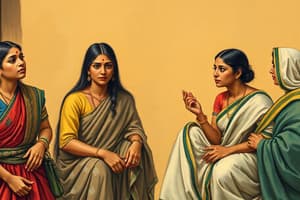Podcast
Questions and Answers
What is the main focus of the article?
What is the main focus of the article?
- The impact of caste systems on social mobility
- The mathematical genius of Shakuntala Devi
- The economic challenges faced by women in lower castes
- The role of women in history (correct)
How do gender norms intersect with caste systems?
How do gender norms intersect with caste systems?
- By providing equal opportunities for men and women in all castes
- By promoting social mobility for women in higher castes
- By reinforcing inequality, especially for women in lower castes (correct)
- By eliminating caste-based discrimination against women
What limitations do lower-caste women face in terms of economic opportunities?
What limitations do lower-caste women face in terms of economic opportunities?
- Limited inheritance rights and marriage restrictions (correct)
- Equal access to land ownership compared to higher castes
- Unrestricted social mobility within the caste system
- Freedom to marry outside their own caste
Why do caste systems perpetuate cycles of poverty and disadvantage?
Why do caste systems perpetuate cycles of poverty and disadvantage?
In which community in Maharashtra, India, do women face restrictions on land inheritance and marriage?
In which community in Maharashtra, India, do women face restrictions on land inheritance and marriage?
What was Shakuntala Devi known for challenging?
What was Shakuntala Devi known for challenging?
What was one of the main challenges faced by Shakuntala in pursuing her passion for mathematics?
What was one of the main challenges faced by Shakuntala in pursuing her passion for mathematics?
How did Savitribai Phule contribute to promoting education for women and Dalits in India?
How did Savitribai Phule contribute to promoting education for women and Dalits in India?
What role did Bhimrao Ramji Ambedkar play in fighting against untouchability?
What role did Bhimrao Ramji Ambedkar play in fighting against untouchability?
What was Radhabai Chitte known for in the context of social reform?
What was Radhabai Chitte known for in the context of social reform?
How did Shakuntala defy societal restrictions in her pursuit of mathematics?
How did Shakuntala defy societal restrictions in her pursuit of mathematics?
What significant impact did Savitribai Phule and Jyotirao Phule have on education in India?
What significant impact did Savitribai Phule and Jyotirao Phule have on education in India?
Flashcards are hidden until you start studying
Study Notes
Women have been central figures throughout history, often playing pivotal roles in social movements seeking change across all aspects of life. One such area where their contributions have been significant is within the context of caste systems and broader societal structures that marginalize certain groups. This article will explore some key historical women who played important roles in challenging these systems and advocating for reform.
Caste Systems and Their Marginalization of Women
Caste systems have historically been structured around hereditary status, with different castes assigned varying levels of power, prestige, and social mobility. These hierarchies frequently intersect with gender norms, leading to even more pronounced inequality for women belonging to lower castes. For instance, among the Pattar Maratha community in Maharashtra, India, the highest caste is called Patil and has almost complete control over land distribution; women from this group can inherit land from their father but must marry within their own caste. Such restrictions limit the economic opportunities available to women from low castes, perpetuating cycles of poverty and disadvantage.
Shakuntala Devi: A Mathematical Genius Who Challenged Traditional Gender Roles
Shakuntala Devi was a celebrated mathematician born into a family of caste-based oppression. She was part of the Dalit (formerly known as Untouchable) community in South India, which traditionally faced severe discrimination due to its position below Brahmins in the Hindu hierarchy. Despite facing challenges from her own family because she did not conform to traditional gender expectations by becoming an independent mathematician, Shakuntala defied those restrictions and became renowned internationally for her skills in mental arithmetic. Her story represents both the struggle against caste-based discrimination and the fight for equal rights for women in society.
Savitribai Phule: Promoting Education for Women and Dalits
Savitribai Phule was another prominent figure who challenged existing social norms, particularly regarding women's education. Born into a family of untouchables during British colonial rule, she fought tooth and nail to ensure that girls were educated equally alongside boys. Together with her husband Jyotirao Phule, they established one of India's first schools for girls from lower castes, contributing significantly towards breaking down barriers preventing women from accessing formal education.
Bhimrao Ramji Ambedkar: Fighting for Equality Through Law Reform
Bhimrao Ramji Ambedkar, often referred to simply as Dr. Ambedkar, was another influential leader who sought to end the practice of untouchability through legal means. As the principal architect of the Indian Constitution, he ensured that it contained strong provisions prohibiting discriminatory practices based on caste, race, religion, sex, or place of birth. His work laid the foundation for future generations to continue fighting against caste-based prejudice and exploitation.
Radhabai Chitte and the Shudrasamaj Movement
Radhabai Chitte was one of the primary leaders of the Shudrasamaj movement in western Karnataka, where she organized mass mobilizations to support individuals who had converted from lower castes to Buddhism, thereby escaping harsh treatment under the rigid caste system. By doing so, she helped challenge prevailing beliefs about caste superiority and contributed to efforts aimed at eradicating discrimination based on caste.
These women, along with many others like them, form an integral part of history's struggles against social injustices. They demonstrate how individual actions can lead to profound changes in societies characterized by complex layers of identity and exclusion. Understanding their stories can help us appreciate their resilience and inspire us to continue fighting for equality today.
Studying That Suits You
Use AI to generate personalized quizzes and flashcards to suit your learning preferences.




